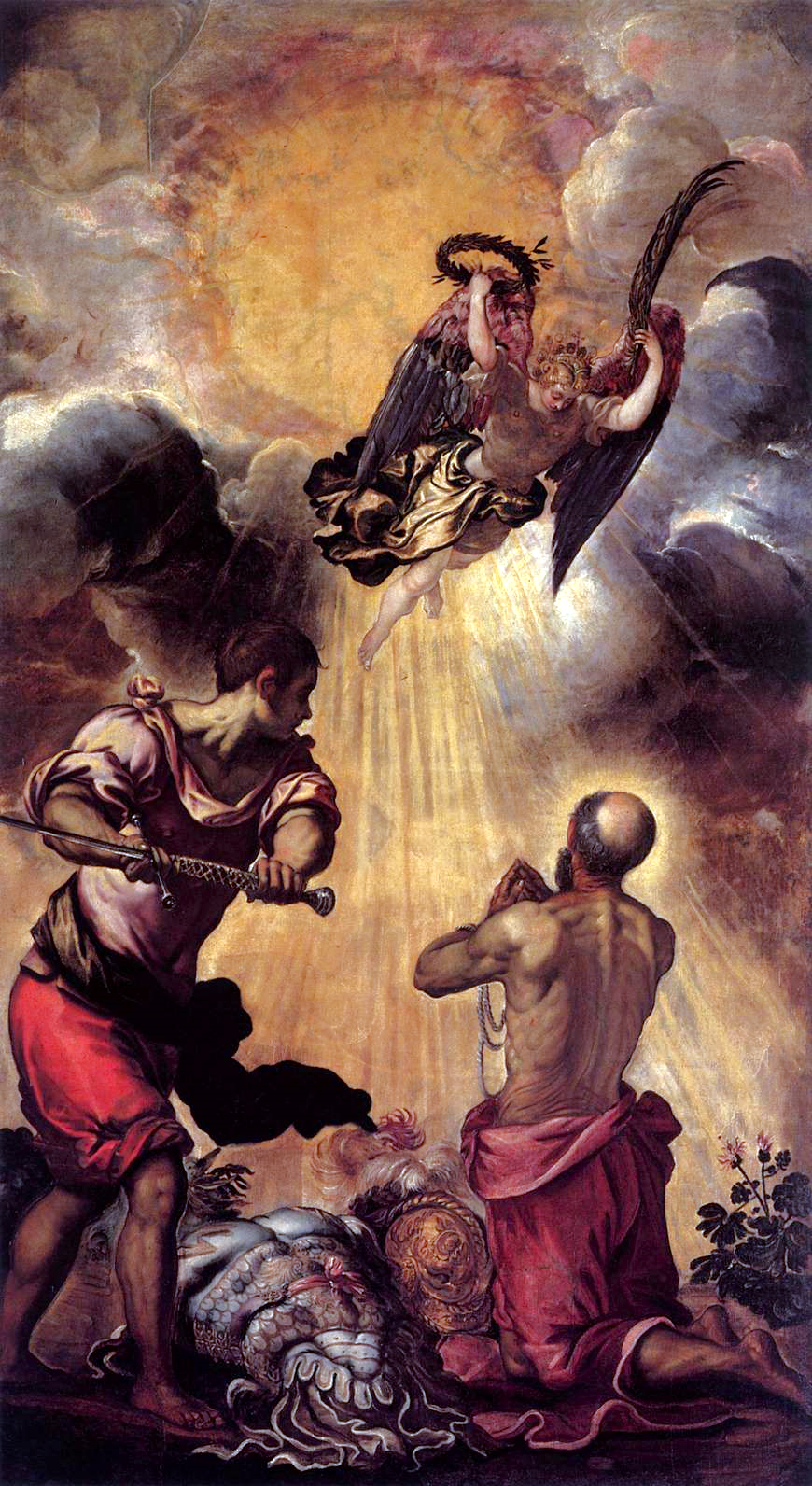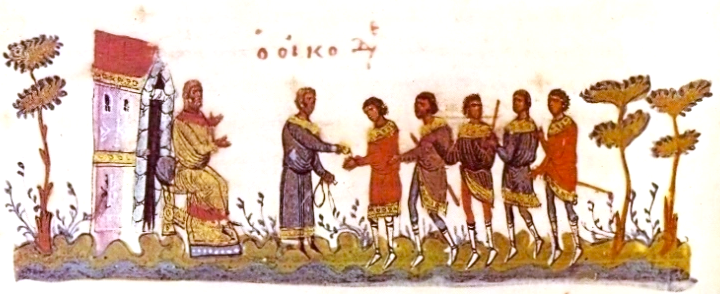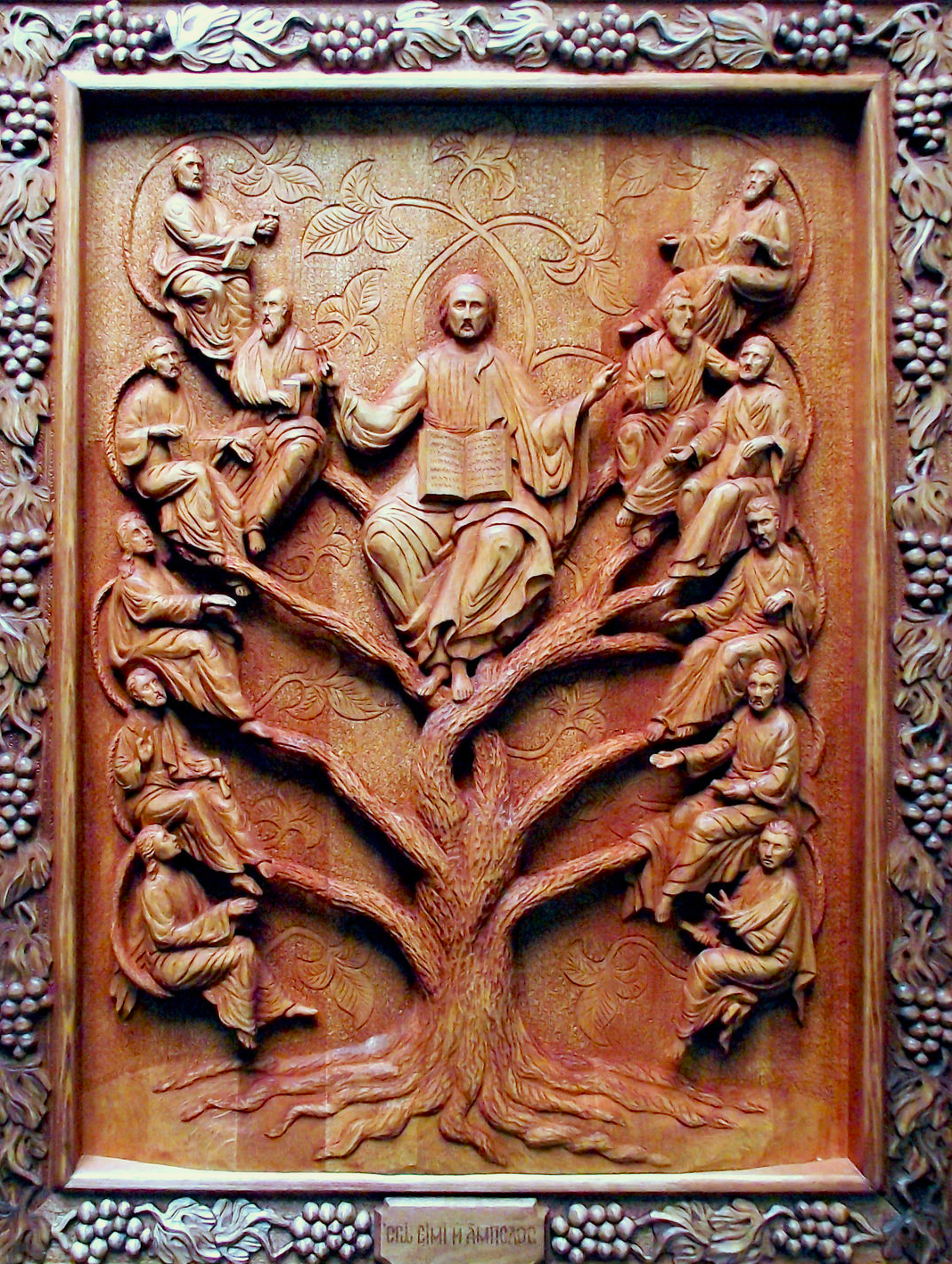Translation of the Epistle to the Corinthians
Brethren: Know you not that they that run in the race, all run indeed, but one receiveth the prize? So run that you may obtain. And everyone that striveth for the mastery refraineth himself from all things: and they indeed that they may receive a corruptible crown; but we an incorruptible one. I therefore so run, not as at an uncertainty; I so fight, not as one beating the air; but I chastise my body, and bring it into subjection, lest perhaps when I have preached to others, I myself should become a castaway. For I would not have you ignorant, brethren, that our fathers were all under the cloud, and all passed through the sea, and all in Moses were baptized, in the cloud and in the sea: and did all eat the same spiritual food, and all drank the same spiritual drink: (and they drank of the spiritual rock that followed them: and the rock was Christ). But with most of them God was not well pleased.
Translation of the Holy Gospel According to Matthew

At that time Jesus spoke to his disciples this parable: The kingdom of heaven is like to an householder who went out early in the morning to hire laborers into his vineyard. And having agreed with the laborers for a penny a day, he sent them into his vineyard. And going out about the third hour, he saw others standing in the market place idle, and he said to them: Go you also into my vineyard, and I will give you what shall be just. And they went their way. And again he went out about the sixth and the ninth hour: and did in like manner. But about the eleventh hour he went out and found others standing, and he said to them: Why stand you here all the day idle? They say to him: Because no man has hired us. He said to them: Go you also into my vineyard. And when evening was come, the lord of the vineyard said to his steward: Call the laborers and pay them their hire, beginning from the last even to the first. When therefore they were come that came about the eleventh hour, they received every man a penny. But when the first also came, they thought that they should receive more: and they also received every man a penny. And receiving it they murmured against the master of the house, saying: These last have worked but one hour, and thou hast made them equal to us that have borne the burden of the day and the heats. But he answering said to one of them: Friend, I do thee no wrong: did thou not agree with me for a penny? Take what is thine and go thy way: I will also give to this last even as to thee. Or, is it not lawful for me to do what I will? Is thy eye evil, because I am good? So shall the last be first, and the first last. For many are called, but few chosen.
The saving words of the Gospel
In the Name of the Father, the Son, the Holy Ghost. Amen
Transcription of Homily
Today we begin the –esima season, a kind of preparation time these three weeks in preparation for the Great Lent. And so the Church, like a good mother, has us start our ascetical penitential path towards Lent so that we don’t have a hard stop and a sudden beginning of a penitential period, but rather we’re easing into it. And so, we have no Gloria today. And we’re also invited to make of this a penitential three weeks in preparation for Lent so that when Ash Wednesday comes we’re not trying to figure it out, (but) we hit the ground running. And so, that’s what the Church is inviting us to today and Paul speaks about this importance of the ordering the passions.
Passions are disordered, thanks to Original Sin, but they’re not utterly or essentially corrupt. So we don’t have a Calvinist view of the human person. We recognize that our passions are disordered, but not hopeless. And so, Paul speaks to us about how to go about that in the Gospel.
A couple of interesting turns here: Οἰκοδεσπότης is the word for landowner. Means the master of the house from that we get despot, right? The word despot in English has something of a pejorative term, but here it simply means master of the house οἰκοδεσπότης. And then, our Lord uses this word to describe the οἰκοδεσπότης who goes out, comes forth, and this is an interesting word ἐξελθεῖν because it has a solemn usage. Our Lord uses this to describe His own coming from the Father. He says, I go forth, ἐξελθεῖν, from the Father. And, we see that also on Holy Thursday night: He went out ἐξελθεῖν. So it’s a verb that has a certain solemnity to it, a going forth. It’s not a banal term. And so, when it’s used here, four times clearly and one time it’s intuited through ellipsis, well, there’s a sacred, a solemn moment, in the call of the workers.
There’s something holy about the invitation. It’s not a casual thing to be invited by God, to join Him in His enterprise. This happens in our baptism. It happens in a vocational call. It also happens in the moment when He appeals to our conscience. There’s something holy about that. There’s something solemn, and it merits a response.
Also, when we look at the different times that people start working in His vineyard, we can’t deny the fact that He was working from before the first shift started. He is the one, even though it says that He has a foreman who helps Him, He is the one who’s out under the same heat, chasing after workers. And He’s under the same sun as everyone else searching for souls, calling them, inviting them: “Will you participate in this labor of Mine?” And as the parable continues, we better understand how unmoored, purposeless, and unoriented is the life of the idle man who is not about the things of God. In His mercy, He invites them, nonetheless, to leave that existence and join in His enterprise. Notice too, that even though He has a foreman, He does this invitation Himself. It’s a personal relationship that He wants; a personal relationship. Even though He has agents, His call is His.
And notice too that in the first shift, they’re told what their wages will be. After that, He says, “I will give you what is just.” And the word just not only means justice in terms of giving each his due but just as also being made just, being made righteous. And then this is going to be a key to understand the relationship between those laborers that are in good standing with Him. And we see in His coming and going His ἐξελθεῖν, His going forth, this internal dynamism He doesn’t stop moving. He’s active the entire day tirelessly seeking souls. And that’s also a sign of life, right? If there isn’t interior growth, if there isn’t expansion, if there isn’t this self-communication of one’s presence, there isn’t life and that’s something that withers away.
So our Lord has this interior dynamism that He shares with others. And this is what Thomas Aquinas calls bonum diffusivum sui, that goodness communicates itself. Goodness gives of itself. And so, when our Lord invites us to be cooperators in His vineyard, it’s not to be consumerists of grace, mere recipients of His gifts, but to be active cooperators. Active cooperators. And with that gift, comes a great responsibility. And so, this act of cooperation, then, implies identification; it implies configuration. If our idea of being a good Catholic is to frequent the sacraments, pray and avoid sin, that’s a very low bar. That’s just the start. If our spiritual program consists of avoiding sin, that doesn’t really end well. Our Lord doesn’t invite us to not crucify Him again. Okay? He invites us in the Sermon on the Mount to perfection: Be perfect as My heavenly Father is perfect. And so, that is what He’s inviting us to.
And this perfection, then, is not in the order of physical strength or intellect, it’s in the order of virtue, so that the theological virtues are active, they’re thriving. And the other infused virtues, through the presence of grace in the soul, is transforming us. And then, this is the role of the passions, because our passions are not our enemies, if we give them free rein, then they do become the enemies and they become a true despot, a tyrant and they demand totality. But the οἰκοδεσπότης, the master of the vineyard invites us to channel our passions towards Him. And this is done in the first moment of temptation. When we turn towards Him in the first moment of temptation, we’ve already won. Because we’ve made our choice and when we follow through with that, it gives Him great glory. So our passions, then, serve His purposes. And how does this work? Infused virtue reaches down to those most base passions, and when we make that choice in the first moment of temptation, it’s an offering of the passions to Him. And so the passions rather than being squelched are channeled, they’re ordered, reordered. And what ensues is holiness.
So we’re not set up for failure. Our Lord gives us all the means that we need and what is the means in particular? It’s Himself; not the penny, not the denarius, not the day’s wage, but as James says in his letter, Jesus Christ is the gift of the Father. He is the true payment then, and so that then explains to us what this agreement is; Have we not agreed? That’s a real fascinating word; συνεφώνησάς. Right? That’s where we get the word symphony from. It means a harmonizing of different voices, that’s what Matthew uses. And so, this harmonizing with different voices means that our human voice, our human will, joins the Divine and it’s elevated. It’s transformed., configured with His we don’t lose our will. It’s purified, it’s elevated. And so Christ then becomes the real recompense. We receive Him. We are identified with Him. We work for Him. We imitate His interior dynamism, this activity, which is not frenetic, it’s ordered, but it’s ceaseless. And so, when goodness shares of itself, we don’t receive gifts, we receive Him who is the gift, and that makes all the difference. And may this then be our life as well.
In the Name of the Father, the Son, the Holy Ghost. Amen
— Fr. Ermatinger




